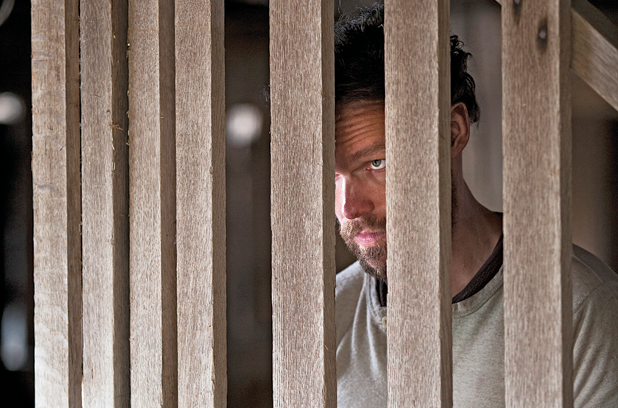“Old woods and deep. At one time in the world there were woods that no one owned and these were like them.” –Cormac McCarthy
When reading a Cormac McCarthy novel one is entered into a harsh world where there is not only dark, but a dark that is sometimes, well, reallly really gruesomely dark (or for anyone who’s ever seen No Country for Old Men or The Road, both too based on McCarthy works). It’s quite obvious James Franco knew this going into directing Child of God, that premiered at the Toronto International Film Festival this week. So if you’re expecting to gawk at Franco amidst some love story for an hour and a half, probably don’t go see this one (though he does make an appearance towards the end, don’t worry.)
But what’s really good storytelling without getting a little shaken up? And in a breakthrough lead for Scott Haze as Lester Ballard—who actually devoted four months out in the wilderness of Tennessee where the novel takes place to get into the role—his performance is truly impressive, all things about the very lost character considered.
In a middle-of-nowhere town you have Lester, a social outcast who lives in the outskirts of a property in the Tennessee hills. There is an auction going on to sell the very same property in which he makes his home (a broken down shed), where he listens from afar. Growing angrier by the second, he starts protesting his “right” to stay; he pulls out his rifle, that as you will see, never leaves his side. To stop him from shooting the auctioneer, someone hits him from behind with a metal shovel. “Lester Ballard never could hold his head right after that,” the novel reads.
So it goes on, Lester, scarred from the get-go as a poor, homeless outcast, continues to travel onward (which, is not very far at all)—cold and alone. His experience of the world is shaped by his ventures through the lonely forest, away from society and isolated from people. When he does happen to interact with another human being, he doesn’t actually know how—resulting in an awkwardness that’s not only unintended, but even innocent due to his inexperience.
You want to feel for Lester: his naiveté to the societal world, you really do. But things start to take a weird turn when he comes across a young couple parked on the side of the road. He watches them from afar, but cannot control his urge to, uhh, jerk off while watching them. They spot him and he runs off—and this moment embarks a very strange future for Lester’s encounters with mysteriously parked cars.
As loneliness sometimes grows, the mental psych starts to deteriorate from the innateness that it once was—ultimately turning evil. After Lester’s repeated ostracization from authority, his inability to even stay friends with a couple of stuffed animals he won at a fair (he thought they were conspiring against him), and his failed “relationships”, the repetitiveness of this isolated life starts to multiply, and so do his victims.
I don’t want to give the story’s entirety away, especially if you’re unfamiliar with McCarthy and just want to plainly see the film based on it being Franco’s directorial debut, but watching Child of God is a true testament to the purpose of cinema: telling a story that crosses a definite line of comfort, reminding the person watching that these evil things do happen, that the life you know existing at this very moment is simultaneously paralleled by all the Lesters out there—the ones nobody loves with nowhere to go.
(photo via Mubi)




